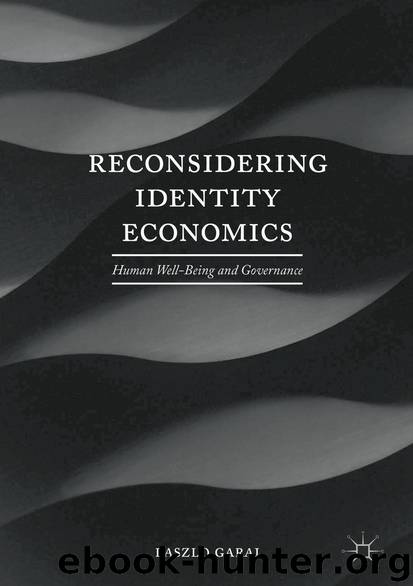Reconsidering Identity Economics by Laszlo Garai

Author:Laszlo Garai
Language: eng
Format: epub
Publisher: Palgrave Macmillan US, New York
The Measure of Production of Human Resources
The value of an activity can be determined not only by its utility, expressed in the value-in-use that it has produced, or by the value-in-exchange expressed in the price paid for the activity. It can also be determined by satisfaction, which is also two-sided: from the manifestation of the person’s technical dispositions in his or her activity that masters things 1 and from the display by the person of his or her social dispositions by belonging to social categories that master other persons.
In the latter case, the stake that effectively motivates the person’s decisions is not money but status.
Vance Packard was among the first to describe the phenomenon of status seeking (The Status Seekers. Penguin Books Ltd.), which seems to be becoming as general a passion of the modern age as money seeking was under the conditions of a classical capitalist formation. This change is also evident in the fact that while the old craving impelled one to procure money, this new passion may prompt one to spend money that one may not have earned but only borrowed, and the satisfaction that one receives is not that of consuming the commodity thus purchased according to its value-in-use but of spending money, which symbolizes status.
However, money raised can also symbolize status. On such occasions, what we are primarily interested in is not the difference between expenses and income (for instance, between the inconvenience of an activity and the reward for it) but the difference between our income and the income of others.
In his classic experiment, Tajfel determined that—depending on the context of social reality—the subject may be prepared to regard the difference between the income of the in-group and an out-group as more important than the absolute size of the income of his or her group, even if the two groups were formed according to so negligible a quality as the outcome of a manipulated test that “demonstrated” which of two painters, Klee and Kandinsky, the subject allegedly prefers, and which painter the other supposed subjects, whom the first subject knows only by their initials, prefer (Human groups and social categories. Studies in social psychology. Cambridge University Press. Cambridge etc., 1981; see esp. pp. 268–287).
In connection with Hungary’s economic reform, it has often been suggested that the leveling policy should be replaced by payments that are better adjusted to unequal performances. One must realize that this “egalitarianism” has never meant equally allocated pay and additional benefits for 10 million Hungarians. In addition, an efficiency wage will never mean acknowledging how valuable is for the society each of the multiple million performances (which are, over and above, for qualitative reasons, incommensurable). In both cases, we are addressing spontaneous or deliberately established social categories within which organizations attempt to establish equality and between which they attempt to establish inequality. We do the same when according to established or just being established social categories (that may be the same as those kept in evidence by the organization), we exaggerate our similarities and differences.
Download
This site does not store any files on its server. We only index and link to content provided by other sites. Please contact the content providers to delete copyright contents if any and email us, we'll remove relevant links or contents immediately.
Bad Blood by John Carreyrou(6589)
Rich Dad Poor Dad by Robert T. Kiyosaki(6533)
Principles: Life and Work by Ray Dalio(6307)
Playing to Win_ How Strategy Really Works by A.G. Lafley & Roger L. Martin(6109)
Management Strategies for the Cloud Revolution: How Cloud Computing Is Transforming Business and Why You Can't Afford to Be Left Behind by Charles Babcock(4553)
The Confidence Code by Katty Kay(4223)
Thinking in Bets by Annie Duke(4189)
American Kingpin by Nick Bilton(3827)
Delivering Happiness by Tony Hsieh(3399)
Project Animal Farm: An Accidental Journey into the Secret World of Farming and the Truth About Our Food by Sonia Faruqi(3196)
The Power of Habit by Charles Duhigg(3097)
The Tyranny of Metrics by Jerry Z. Muller(3034)
Brotopia by Emily Chang(3033)
Mastering Bitcoin: Programming the Open Blockchain by Andreas M. Antonopoulos(3017)
The Marketing Plan Handbook: Develop Big-Picture Marketing Plans for Pennies on the Dollar by Robert W. Bly(3014)
I Live in the Future & Here's How It Works by Nick Bilton(2964)
The Content Trap by Bharat Anand(2893)
Building a StoryBrand by Donald Miller(2871)
Applied Empathy by Michael Ventura(2870)
